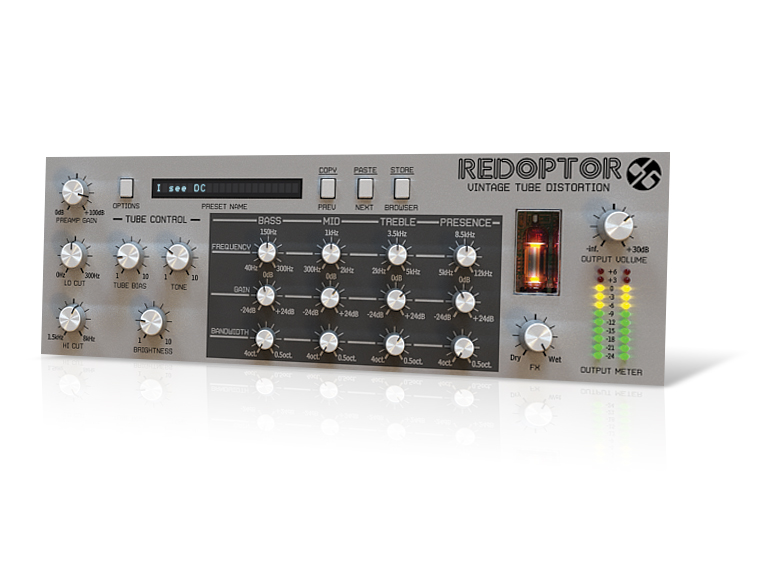MusicRadar Verdict
Unless you're planning to use it only on guitars, hang on for the update, we say.
Pros
- +
Convincing tube simulation. Excellent D16 sound quality. Plenty of control over valve behaviour. Great value. Good range of presets.
Cons
- -
Filtering limits usefulness! Redoptor sounds tube-tastic, but that filtering issue is a real bummer.
MusicRadar's got your back
It made its name with dead-on emulations of vintage Roland techno boxes, but there's more to D16 Group than just acid synths and stomping drum machines.
Indeed, over the past year or so, the company has introduced its Silver Line of high-quality, low-cost plug-in effects. The latest, Redoptor, is billed as a "vintage tube distortion", and is said to have been modelled on guitar amp circuitry.
It emulates the preamp stage only so, to use it for guitars, you're best to use it in conjunction with other plug-ins - eg, a cabinet simulator - otherwise it'll sound too harsh when pushed hard (as a real guitar preamp would if you DI'ed it!).
As far as functionality goes, there's a preset system with definable categories, MIDI learn, and four 'quality' modes. Increasing the latter uses more CPU, but counteracts top-end harshness with more extreme distortions.
Oh, and Redoptor works in stereo, too.
In detail
The signal path starts with the tube preamp stage. This has more controls than most valve-apeing effects. You can drive the incoming signal by up to 100dB, before it runs through a high-pass then a low-pass filter.
The former ranges from 0Hz to 3kHz, while the latter goes from 1.5kHz but tops out at only 8kHz. And even if you set the high-pass to 0Hz, the bass is curtailed.
In other words, any signal passed through Redoptor is filtered, which is OK for guitars, but often undesirable for other signals. We'd like to see a bypass option and larger ranges for the filters in an update.
The Tube Bias parameter dictates the amplitude of the odd harmonics introduced - it's a very subtle effect that's most noticeable when processing simple tones. Brightness is likened to offering a transition from valve overdrive to harder diode-style clipping.
Finally, Tone sets the balance between the direct tube-processed signal and a high-pass-filtered version.
The preamp stage is followed by a four-band parametric EQ (frequency, gain, Q) for further shaping of the signal. Obvious uses for the EQ would be to approximate a speaker simulation (eg, by shearing off the treble) or to somewhat compensate for the preamp's filtering antics.
In use
D16 previously proved its crunch credentials with the delightful Devastor multiband distortion, and Redoptor sounds every bit as good as we've come to expect from the company.
To test Redoptor with guitars, we placed it in front of Overloud's TH1 (used only for its speaker simulation). A range of tones was possible, from clean funk to 'just breaking up' vintage blues tones through full-on rock.
Despite the filtering frustrations outlined above, we enjoyed Redoptor on non-guitar signals, too. Subtle enhancements can be had by zoning in on a frequency range with the filtering knobs, dialling in just enough gain to warm the sound up without making it obviously distorted, then setting the dry/wet mix knob to impart some of this new-found warmth to the signal.
The CM Studio's own Dominator synth sounded more analogue than ever when using this technique, while more aggressive settings can really make synths scream, especially with simpler patches. Percussive material also benefited.
Summary
SIn short, Redoptor sounds excellent on all manner of signals, and seems to offer a smoother transition from clean to distorted than many plug-ins of this type.
It's just a shame that, as a general purpose valve distortion, those filters literally take the edge off proceedings. D16 reckons that it'll be rectifying the situation in a future update, which should see Redoptor unleashing it's full potential.
As far as guitars go, if you're not quite satisfied with the valve tones of your current software, you could buy Redoptor to use in conjunction with it, as a preamp. Alternatively, you could partner up Redoptor with an amp/cab sim such as Voxengo's free Boogex to make an affordable yet very convincing setup.
Listen to Redoptor being applied to a guitar, electronic drums and real drums:
Computer Music magazine is the world’s best selling publication dedicated solely to making great music with your Mac or PC computer. Each issue it brings its lucky readers the best in cutting-edge tutorials, need-to-know, expert software reviews and even all the tools you actually need to make great music today, courtesy of our legendary CM Plugin Suite.
“A synthesizer that is both easy to use and fun to play whilst maintaining a decent degree of programming depth and flexibility”: PWM Mantis review
“I feel like that song had everything we needed to come back with”: Bring Me The Horizon’s Lee Malia on Shadow Moses, its riff and the secrets behind its tone, and why it was the right anthem at the right time
“I said, ‘Are we sure we can write a song about death?’”: The story of Mike + The Mechanics' classic No.1 The Living Years











